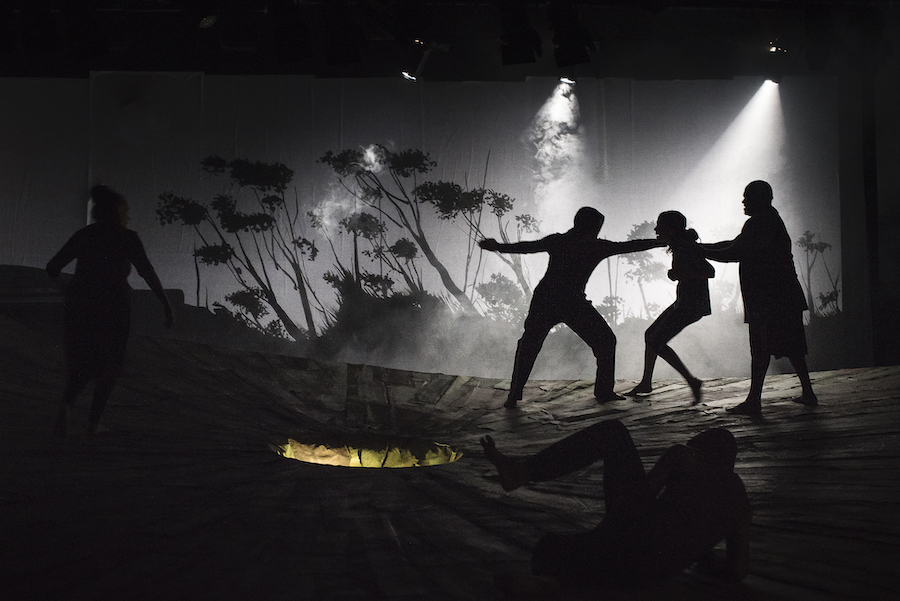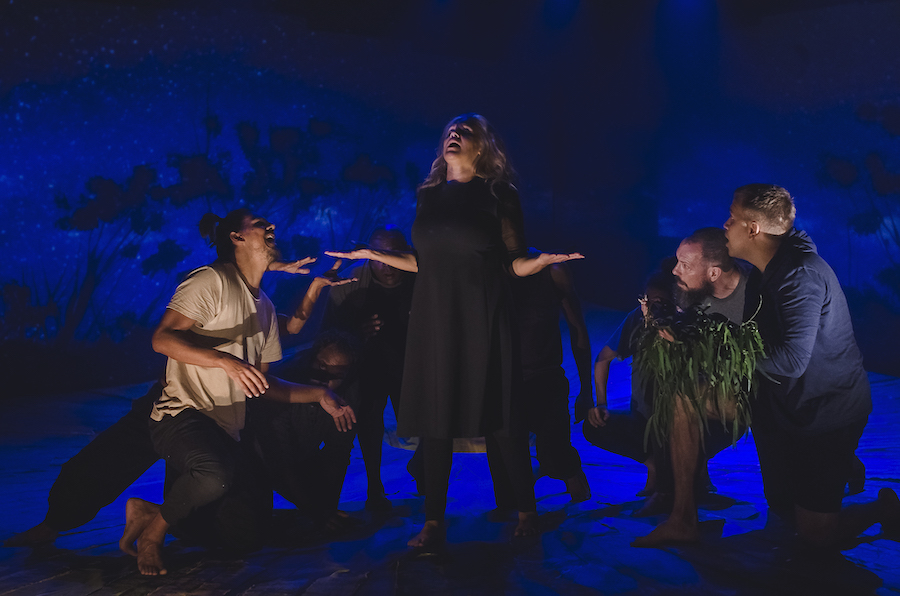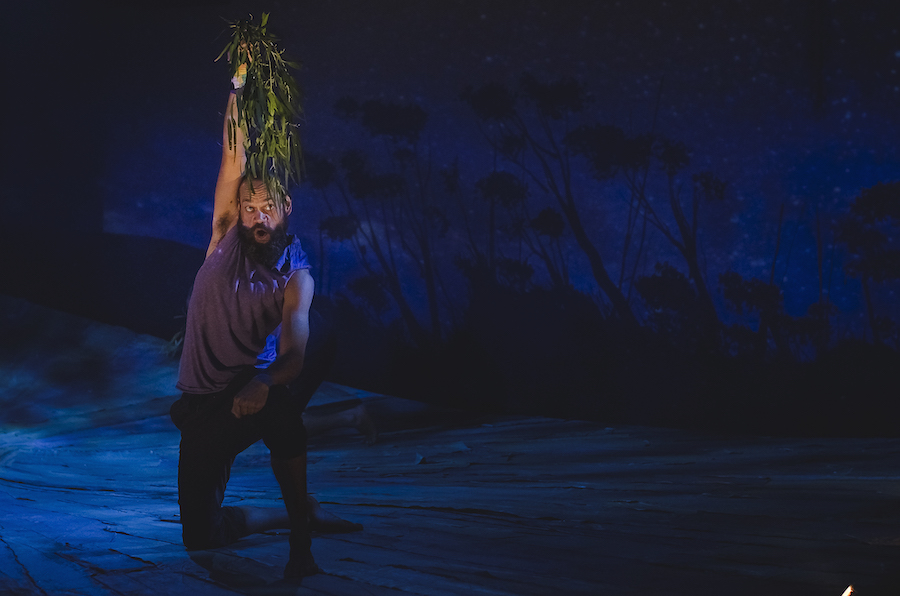There was a sense of history being made at the premiere of Yirra Yaakin’s Hecate. It is, to my knowledge as a wedjela (white) critic, the first full-length theatre work performed in an Indigenous Australian language – namely the Noongar language of the peoples of Perth and South Western Australia. Yirra Yaakin has taken the decision to present Hecate without projected English language subtitles. If ever there was a moment for white audiences to be humbled by being let into a different cultural realm, to which we must pay respect, this was it.
 Cast members of Hecate. Photo © Dana Weeks
Cast members of Hecate. Photo © Dana Weeks
This is therefore not an easy production. Director and translator Kylie Bracknell has observed that language is not only about “words,” crucial as the text is. Rather language is also about bodily gesture, visual images, values, songs, yarning, jokes, laughter and tears. The multi-skilled performers work hard to bring out this expanded idea of performance, and although there is a sense that speech, breathed, shouted, sung and whispered into being, is at the heart of the production, it is nevertheless a profoundly theatrical work.
Hecate is an adaptation of William Shakespeare’s tale of vaulting ambition and darkly fated action, in which the protagonist Macbeth starts as a warrior defending his sovereign only to usurp the crown and become a bloody agent of discord. Macbeth is drawn into “unnatural acts,” first by the prophecies of three “weird women” or witches (here played as male trickster figures), and then by the exhortations of his wife.
Those with knowledge of Shakespeare’s play will have no difficulty identifying the topic of each scene. More tricky is matching specific pronunciations with the specific thoughts and words of the characters. The opacity of the language – both of Shakespeare’s text written in iambic pentameter, and of its translation into Noongar – renders the performance stylised, mythic and epic. Maitland Schnaars as Macbeth is particularly striking, though at times his aural sustain of Noongar’s distinctive vowels seems to slow the action in a way which I was not always sure was intentional. Kylie Bracknell’s almost pantomimic approach to gesture and dance does however communicate much which non-Noongar speakers might otherwise struggle to perceive.
 Ian Wilkes, Rubeun Yorkshire, Trevor Ryan, Della Rae Morrison, Maitland Schnaars and Mark Nannup in Hecate. Photo © Dana Weeks
Ian Wilkes, Rubeun Yorkshire, Trevor Ryan, Della Rae Morrison, Maitland Schnaars and Mark Nannup in Hecate. Photo © Dana Weeks
It is ultimately music and song, provided by Clint Bracknell, which is most effective at transforming dramatic expressions into readable, complex actions. In an especially moving scene, those rebels who wish to oppose Macbeth (masterfully played by Ian Wilkes and Mark Nannup) come together by joining in a mourning song initiated by Wilkes, and only then taken up by Nannup.
Some expressions nevertheless remain elusive for non-language speakers. I could not pick, for example, the moment where Macbeth mourns for his wife after their shared evil dealings drive her to suicide. Hecate is portrayed as a powerful figure who oversees the drama as a whole, protecting Banquo’s daughter Fleance, and thereby ensuring that Banquo’s lineage prospers whilst Macbeth’s does not. But quite why she does so is not entirely apparent. Noongar boodjar and the land is “in disarray,” the synopsis tells us, but why? Bloody acts by Noongar during the Dreaming and afterwards were hardly unusual, and Shakespeare’s own youth was marked by a war of succession in which his royal patron’s family was complicit.
It is therefore unclear why Macbeth’s own violent acts of self-interest might conflict with the natural order in the absence of a Christian value system and European ideas of kingship and fealty. Macbeth’s bloody power play is depicted as a chaotic interregnum in the environmental balances which Hecate and the other spirits of Country promote, but exactly how his self-driven rise to power is incompatible with these laws remains unclear.
 Kyle J Morrison in Hecate. Photo © Dana Weeks
Kyle J Morrison in Hecate. Photo © Dana Weeks
The performers repeatedly mimic the sounds of frogs, insects, spirits, and the dark, unknown beasts which populate both the Noongar and the white imagination. From this it is clear that interactions between Macbeth, Hecate, and her trickster companions, are that which has made these voices of the land sing out. Exactly what these soundings mean though is something non-language speakers must take on faith.
However, perhaps this is the most profound message which the production offers. I will never fully appreciate the depths of the Noongar experience, and in the end, wedjela such as myself have little choice but to accept these readings when offered.
Ken Gelder and Jane Jacobs have argued that white Australia’s refusal to deal with the legacy of violence upon which the nation is based means that we remain “unsettled” peoples, forever “haunted” by deathly figures who represent the somehow absent-yet-present spectral presences remaining in the landscape in the wake of our murderous history.
I can think of no better embodiment of these revenant forces than Rubeun Yorkshire’s performance as Banquo’s ghost. Evoking Caribbean models as well as those of Indigenous Australia, he shambles across the stage, eyes rolling skyward, water dripping from his clothes. He is a not-fully-dead being which has resurfaced from within an ancient ngarma hole, a potent symbol of productive interactions between Noongar and the land, where extant rock pools were enlarged through the action of local peoples so that the depression might provide life and water for all.
While Hecate reveals the vitality which pulses through Country by calling up a wondrous star-scape which is suddenly projected behind her, it is Yorkshire’s zombie which I will remember whispering to wedjela like me, in words which even he did not literally enunciate on stage, but which are implied by his very presence.
Hecate is at the Subiaco Arts Centre as part of Perth Festival until February 16











Comments
Log in to join the conversation.